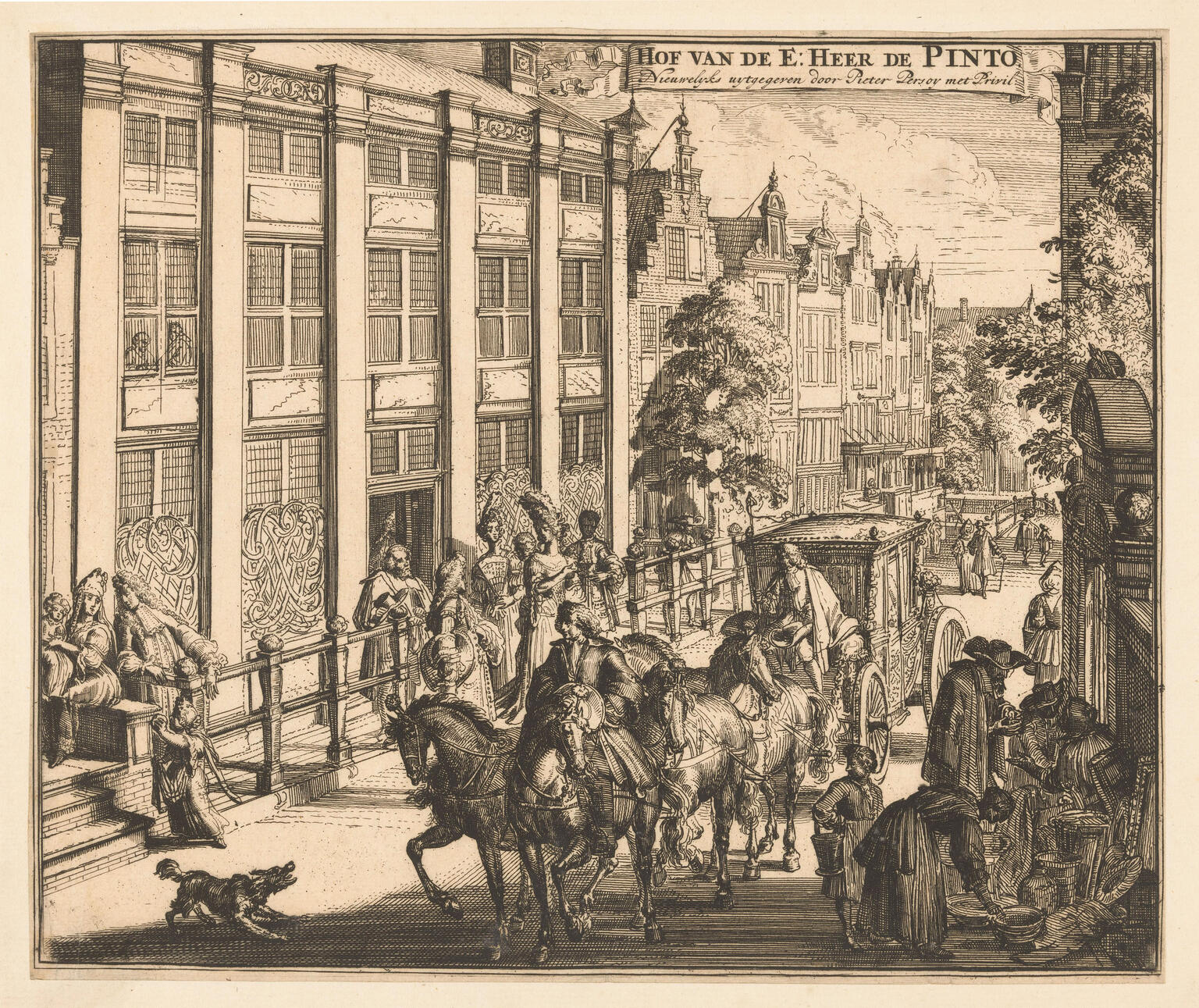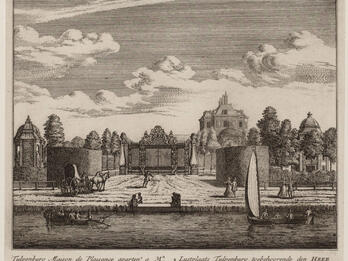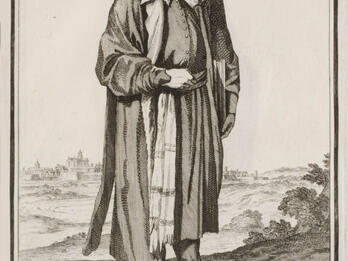Family Chronicle
When I was born, I was given the name Manuel, after my grandfather, Manuel Alvares Pinto, as was said earlier. For this reason and because I was my father’s eldest son, my grandfather always had me near him and had me brought up in his home. I remember that he practically always kept me at his side, even though I was a child, teaching and instructing me until he died, as was reported above. After his death, my grandmother did not let me go. I stayed with her and got to be so used to living in her house, that it might as well have been my father’s house. It was so huge (every room was in itself a very spacious lodging) that when I happened to go into my parents’ home, I felt uneasy. Thus it was, that, of all the grandchildren, I was the only one to be privileged and cherished as such. God took her unto Himself, as was described above.
I then returned to my parents, one might say as an outsider, having already attained my majority. My parents saw to it that I learn something of everything, not only what I needed as preparation for my career, but also horseback riding, fencing, music, and the lute and the guitar, until we left Antwerp. From my grandparents, may they be with God in heaven, I had already acquired the knowledge of God, and what it meant to be a Jew. I remember that as little and innocent as I was, when for our sins they took me to church, I used to recite there the words of the Shema, which my grandfather had taught me. This might have caused disaster had I not observed the lesson of never saying them aloud, for fear that someone might hear them. We were also much beholden, I and my brothers and sisters, to the good upbringing given us by Branca Rodrigues, may she be with God in heaven. She died in Antwerp and was the grandmother of Rifca da Silva, my mother’s maid, who was brought from Lisbon.
Since we came to Holland and I married my beloved cousin, and my father-in-law died, it pleased God to hear my prayers and my fervent desire to have children. My beloved cousin became pregnant. This was why, after we decided we couldn’t stand the isolation of Rotterdam any more and were going to move to Amsterdam, we postponed our departure for one year. I had already exchanged our house in Rotterdam for the one in Amsterdam, paying an additional 19,000 guilders cash. For that reason, my brother Jacob de Pinto moved in. He had already been living for two years in Amsterdam, along with his father-in-law Abraham Pereira, as well as Abrao Nunes Henriques, my aunt Maria and her son-in-law, Moseh Rodrigues da Costa, because they couldn’t get ahead or do business in Rotterdam. Also my brother-in-law Suasso, then engaged to my sister, had decided to go straight [from Antwerp] to Amsterdam. Thus it was depressing for young people to live in Rotterdam and even though I was not yet resolved to move, my father, knowing the reason, obliged me to do so.
But it was necessary to postpone it one more year, in view of my beloved cousin Rachel de Pinto Henriques’s pregnancy. On August 18, 1652, she gave birth to my first-born son, may God spare him that I might see his numerous descendants and get much pleasure from him. There was great joy in my house and in my father’s. I immediately sent word to Amsterdam for all the relatives and friends to come and celebrate this joyous event with me. But for my sins it was to see my affliction and great sorrow. It was the will of God that on the following August 24, the Sabbath, around midnight, He took away my beloved cousin, at such a tender age and so meritorious of life and affection. This was a stroke of misfortune which I shall bewail as long as I live. On the Sunday, the eighth day following the birth of my son, his circumcision was performed by Haham David Pardo, my father being his godfather. I celebrated with tears, as did all those in attendance. After the circumcision we took the body of my beloved cousin to the Bet Haim of Rotterdam, where she now lies. My household and I remained with the loneliness and nostalgia which this great loss entailed. God willed that there remained for me the consolation of raising my handsome son, whom I gave the name of my father-in-law and uncle David de Pinto, in memory of my beloved cousin, and the name Manuel in memory of my grandfather, Manuel Alvares Pinto, who raised me and loved me so much.
The following January (1653) my sister wed Ishac Suasso. The marriage was celebrated in my father’s home, without my making an appearance there, except during one of the “seven days” [of wedding celebrations]. I went in my coach, which was still draped with crape, just as I wore a long cape dragging along the ground, which I changed for a shorter one upon entering the nuptial hall. As soon as I had made myself seen, I went home.
In May of 1653, I moved with my household and my son to Amsterdam. One year later, I was summoned by my parents, who urged me to take a wife to raise my son, which I refused and persisted in not doing, until Mother beseeched me and ordered me to marry her orphaned niece, the daughter of Hana da Veiga, who had no dowry, was of my age and already a mature woman, who would be able to raise my David. For my accomplishing this misva God would preserve him and allow us to derive all the pleasures we expected from him, I did not give in at all, nor could my parents convince me to take that decision. So I returned home and left my son there with his wet-nurse, to be cared for under the supervision of my mother, while I was having some transformations carried out in the house which I bought. Afterwards, on June 1, 1654, my parents came to visit us in Amsterdam, bringing along my son for whom I was already very lonesome. Then they again brought up the subject of this marriage, my brothers and sisters also trying to convince me. So I resolved to give them that satisfaction.
It was accomplished on July 26, 1654, when I married my second cousin Rachel da Veiga, daughter of Hana da Veiga and Francisco Rodrigues Veiga. I was accompanied by my father and my brother-in-law Ishac Israel Suasso. My bride was led to the canopy by Rifca de Pinto and Rachel da Costa, my cousin, the wife of Moseh Rodrigues da Costa. Ten days later I brought her to my house, where I gave a banquet for all my relatives on the Sabbath when she went to the synagogue, may it be for a very good omen.
Right after I moved to Amsterdam, on Shabu’ot [Pentecost] of 1653, I was elected Parnás de Talmud Tora, and I served in all the offices which are given in this Congregation. In the year 5419 [1659], they elected me Gabay de Sedaca, after having been Hatan Tora in the year 5416 [1656]. And in the year 5425 (1665), I was elected Parnás of the whole congregation for the first time; in the year 5427 [1667], I became a member of the Brotherhood of Orphaned Girls, may it all be for the service of the blessed Lord. On October 14, 1671, my son David Emanuel de Pinto married his first cousin Rachel, the daughter of my brother Jacob de Pinto, may it be for good and the service of God, and may he grant them felicitous and happy descendants, in virtue and fear of God. On December 6th of that year, they married at the City Hall.
Notes
Words in brackets appear in the original translation.
Credits
Isaac de Pinto, Family Chronicle, trans. H. P. Salomon, in H. P. Salomon, “The ‘De pinto’ Manuscript: A 17th Century Marrano Family History,” Studia Rosenthaliana, vol. IX, no. 1 (January 1975), pp. 43–45. Translated from the Portuguese, “Family Chronicle,” Ms. Ets Hayyim Library 48e 35. Reprinted with permission of the translator and Studia Rosenthaliana.
Published in: The Posen Library of Jewish Culture and Civilization, vol. 5.






